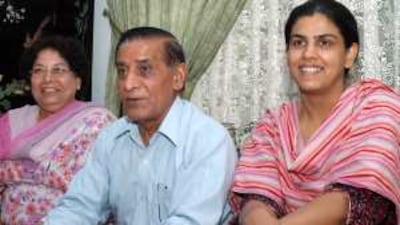ISLAMABAD // Barack Obama's speech to the Muslim world aimed to impress all, but it convinced none of the Sharifs, a middle-class family that is a model of Pakistani aspirations for the kind of "change" associated with the US president. But as poignant was the fact that they had no plan to listen to the hour-long address from Cairo University. My request to watch it with them at their suburban Islamabad home highlighted the fact that few Pakistanis were aware that Mr Obama's address was to be anything out of the ordinary.
The men of the house knew: the patriarch, Mohammed Sharif, a retired navy officer turned lawyer, and son, Arshad, an upcoming Pakistani journalist, move in political circles and were interested, but not enough for them to schedule a live viewing into their respective schedules. The matriarch, Riffat Sharif, and Arshad's wife, Sumaiya - both highly educated and politically aware - thought the afternoon get-together was about reviewing American policies rather than the speech, which neither had heard of, largely because of the Pakistani news media's understandable focus on the militant insurgency raging to the north of Islamabad.
Ultimately, they gathered (minus Arshad, who dashed off to a foreign office briefing) out of courtesy, and, once told they were to be a case study in mainstream Muslim reaction to the Obama speech, out of a sense of collective responsibility. "I have no doubt that he is a good man, but he hasn't lived up to his election promises of change as far as we Pakistanis are concerned. Instead, what we've seen are harsher policies and the corpses of our young army officers being buried to fulfil American demands to do more about militancy," Mrs Sharif said.
"Our leaders are preserving their power by doing more as the Americans have bid. But it is not the sons of members of parliament that are dying in Swat. It is the sons of the middle class, and for them, a single loss heralds a lifelong struggle for the whole family," she said, sitting in front of a picture of her youngest son, an army pathologist serving with the United Nations mission in Sudan. Between several calls to the local cable service provider to improve picture quality, they managed to congregate around the television as Mr Obama strode to the podium.
As he began speaking, the sound level in the room dropped to silence. Mrs Sharif, who had earlier been propped up against a couple of cushions to alleviate a backache, leaned forward, arms folded; Sumaiya was almost oblivious to the presence of the children, who she gave up her job as a university lecturer to raise. Mr Sharif senior, who arrived 15 minutes into the speech, leaned forward and closed his eyes, brow furrowed.
It was soon apparent they at least liked parts of what they were hearing. The US president earned nods of acknowledgement for his knowledge of Islam and frank summations of the Muslim world's issues. I was almost expecting them to join in the applause ringing out from Cairo. Instead, it sparked a heated debate within the family, largely along gender lines. "It was a great speech. He addressed all the issues and sensitivities. The path he has pointed to is difficult, but at least he has taken the first step. It is for everybody's benefit," Mrs Sharif said.
But Mr Sharif, a veteran of Pakistan's 1971 war with India, was having none of it. He is particularly aggrieved that the US president did not list Kashmir among Muslim political grievances, and sees no cause for optimism. "Hope? There is no hope because it is only the national interest of America which is forcing them to improve relations with those Muslim countries who can serve those interests," he said.
"Let him first implement all he has proposed for the Muslim world in the United States. Then he can come and give us such lectures on religious morality." "At least he has taken the first step," countered Mrs Sharif. I asked for Sumaiya's opinion in search of the kind of middle ground Mr Obama has appealed for. "He has tried to save face for himself and America. They say they want peace, but the American troop build-up in Afghanistan is pushing the militants deeper and deeper into Pakistan," she said.
"But I do have hopes. If the Americans really do consider themselves as part of the world, and if we work together, there is a chance for change. But I am sceptical about the 'if'." thussain@thenational.ae

